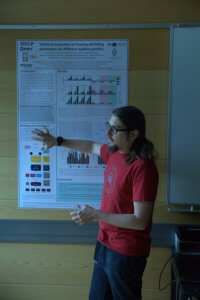
The BEAR project started in March 2016 and it was therefore time for the Annual Review on April 24th, 2018. The review took place at University of Southern Denmark with participation of the project participants, and the project officer Peter Aadal Nielsen from Innovation Fund Denmark. The review was also attended by the project’s Advisory Panel, consisting of:
- Inga Holube, Professor at Jade University of Applied Sciences, Oldenburg, Germany
- Norbert Dillier, Professor at the ENT Department Zurich University Hospital
- Priya Singh, Director of Clinical Studies, UCL Ear Institute, UK
- Mark Leyrens, Thomas More University of Applied Sciences, Mechelen, Belgium, and President of the European Association of Hearing Aid Professionals,
- Stig Arlinger, Professor Emeritus from Linköping Universitet, Sweden (absent)
- Majbritt Garbul Tobberup, president for Høreforeningen Denmark (absent)
The agenda included planned presentations from the currently active work areas, and included hands-on demonstrations of the additional tests, which are being developed and assessed in the project.
From the work on the centralized clinical database, medical doctors Jesper Hvass Schmidt and Anne Wolff reported that almost 200 patients have now been registered in the database for inclusion, and almost all have had hearing aids fitted and attended the follow-up visit. The current work with the database therefore focus on the analysis and producing the intermediate results required for the other project activities.
 From the work with new strategies for profiling and fitting, Sébastien Santurette, Raul Sanchez Lopez, Tobias Neher, and Mouhamad El-Haj-Ali reported on the methods which are currently being tested in laboratory experiments with simulated hearing aids, and alternative fittings, and later in pilot experiments in the clinics. It was also possible to listen to the hearing tests and try the role of patient. The Advisory Panel showed great interest in this discussion and the possible new options, which the new tests may provide for future hearing aid fitting or re-adjustment.
From the work with new strategies for profiling and fitting, Sébastien Santurette, Raul Sanchez Lopez, Tobias Neher, and Mouhamad El-Haj-Ali reported on the methods which are currently being tested in laboratory experiments with simulated hearing aids, and alternative fittings, and later in pilot experiments in the clinics. It was also possible to listen to the hearing tests and try the role of patient. The Advisory Panel showed great interest in this discussion and the possible new options, which the new tests may provide for future hearing aid fitting or re-adjustment.

From the work with assessment methods of the aided listening performance, Sébastien Santurette, Jens Bo Nielsen and Katja Lund reported on the methods which are currently being considered. The Advisory Panel also tried the role of the patient and listened to the tests, and discussed possible implications. Part of this work has included observations in clinics with the purpose of taking advantage of the experience and the formel or unformel tests of user outcomes, which are performed today in the clinics.
After the demonstrations, the plans for future activities and the ambitions for these were reviewed by the project management. At present, most of the project activities are delayed relative to the original plan, but if similar delays are applied for the remaining activities, then it won’t be a problem.

At the end of the day, the Advisory Panel proposed a number of specific attention points for the future work. The panel praised the project participants for the common vision and the strong setup including university hospitals, universities, manufacturers, and technical service. The panel also expressed their satisfaction with the project so far, and had high hopes for the future results.

